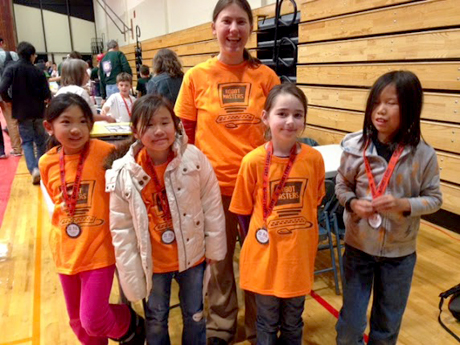Robotics for girls: A grad student's perspective
By Robin Bjorkquist

LEGO robotics? Not my thing.
When Lora Hine, director of educational programs at the Cornell Laboratory for Accelerator-Based Sciences and Education, asked me to co-coach a FIRST LEGO League (FLL) team this past fall, I hesitated. After all, when I was a kid, I would never have joined a robotics team. I had no interest in gadgets, technology or computer programming. I didn't even like science, which seemed to be all about memorizing facts.
But as I learned more about FLL, I found myself getting excited. FLL is a worldwide program for kids ages 9-14. Each team designs, builds and programs an autonomous LEGO Mindstorms robot to perform tasks on a special playing field. In addition to acquiring technical skills, the kids learn to work together and communicate. The robot missions leave endless room for creativity, and the kids get to explore a realm where there isn’t a single “right answer.” The FLL challenge encourages kids to look out into the world, identify real problems and view themselves as instruments of innovation and change.
Lora and I decided to put special effort into recruiting girls for our fledgling team. Women remain underrepresented in STEM (science, technology, engineering and math) fields, and I am always looking for ways to encourage young women to consider scientific careers, as well as support women who are already in the science “pipeline.” The deck is stacked against us in many ways, and I believe that good mentorship and peer support are crucially important.
In early September, we held two information sessions at Tompkins County Public Library. Five girls, grades 3-5, joined our team. We met every Tuesday afternoon at the eXploration Station behind Wilson Lab. The girls voted to name their team the “Robot Masters,” and we got to work.
There were days when I felt some despair – when the girls were bickering, dragging their feet, and breaking Lego models right and left. Good scientists know that sometimes you need to put aside your work and look elsewhere for inspiration. Kids also know this – it’s called “playing.” So when our motivation ran low, we went outside for invigorating team-building activities in the autumn sunshine. We built dancing cup-bots out of batteries, small hobby motors and plastic cups. We lit tiny LED light bulbs with current from a plasma globe. The girls’ delight reminded me of how wondrous the world can be.
I came to appreciate each girl for her unique contribution to the team. There was Anna, who built complicated Lego models with quiet intensity; Lindsey and Abby, who devised a snow-plow-like attachment for the front of their robot; Jillian, articulate and confident, always hoped that she would draw the “leader” card during team-building activities; and Seokyun’s cheerful personality made everything a bit brighter.
In November, we finished the FLL season by participating in a regional qualifying tournament at Corning Community College. The girls got to share their hard work with the tournament judges, show off their robot in action and see other teams. At the end of a long day, I caught sight of our girls, wearing their bright orange Robot Masters T-shirts, staring longingly at the trophies on the prize table. We did not win any prizes, but as the FLL core values say, “What we discover is more important than what we win.” I am proud of the Robot Masters for everything they learned and accomplished.
From where I stand now, I can see that science is not about memorizing facts. Science is a creative, human endeavor. Scientists constantly try out and refine new ideas, just as the kids on an FLL team try out new robot designs and programming strategies. Sometimes there are snags and dead ends. Sometimes the task seems impossible. But if you keep at it, the rewards can be tremendous.
Perhaps one day the Robot Masters will become professional scientists. I hope they will look back on our season together with fondness. As for the trophies, there’s always next year.
Robin Bjorkquist is a graduate student in the field of physics.
Media Contact
Get Cornell news delivered right to your inbox.
Subscribe